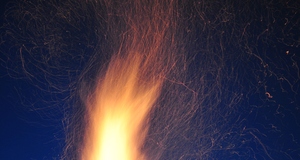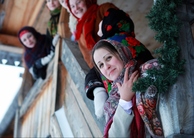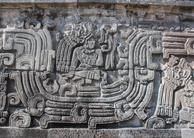Student VoicesHuman Rights in Chile: Remembrance and Reckoning
By
2009, Vol. 1 No. 11 | pg. 4/4 | « ConclusionIt is difficult to understand exactly how a human rights crisis occurs, particularly because the nature and extent of abuse may seem contrary to other human interaction and/or cultural values. In broader structural terms, an international crisis in one area or system does not necessarily cause an immediate crisis in the general society, or not always an obvious one, especially when there is forced silence, oppression, and manipulation of the media. In Chile, the constitutional crisis that occurred with the military coup was offset in part by the superficial resolution of economic crisis. It is also somewhat difficult to understand politicians and policies of the Cold War era, at least from a non-political perspective. Obviously, tensions of the nuclear age and the threats that were perceived by superpowers during the Cold War had an incredible impact on human rights of this century. As mentioned earlier, that the concept of genocide is now being considered as a term that includes political parties indicates how completely polar political ideologies can impact the lives of everyday people. Although this paper is an attempt to focus on one country, evidence of the human rights crisis in Chile indicates that the international situation had a huge impact on the domestic situation. In exploring the role of the U.S. in Chilean politics one must consider the policies supported by the U.S. with regard to treatment of its neighbors. In analyzing comments given by Kissinger and others, as well as understanding the atmosphere of the CIA during this time, it would be good to go back and look at the Containment policies started under the Eisenhower administration in Southeast Asia.Communism, at this point, was seen as such a threat that Eisenhower introduced the domino theory in 1954 that became incredibly important in international politics. Eisenhower said: “You have a row of dominos, you knock over the first one, and what will happen to the last one is the certainty that it will go over very quickly.” (Kort, 38) Thus, Eisenhower reasoned, it was necessary to prevent further gains of communism throughout the world. The situation in the Americas was exacerbated with the Cuban Missile Crisis in 1962. This certainly had a tremendous impact on the sociopolitical scene in Chile. The communist party in Chile was very active and found many representatives who had an international voice, such as Pablo Neruda. Repression was clearly against the left and international forces were willing to sacrifice democracy, its principles, and basic human rights because of perceived security threats. Indeed, from a human rights perspective, the Spanish definition of genocide— that is, inclusive of political groups— should be researched in order to understand exactly what tragedy did occur. With the most recent democratic reforms in Chile, mainly the end to Pinochet’s immunity as head of state and banning him from his permanent seat in Congress, the cause of human rights in Chile is gaining progress. In reference to the most recent developments in efforts to prosecute Pinochet, one article states:
In addition, these reforms have opened the way to prosecute other military leaders who operated under Pinochet. When Chile opened up to democracy in 1989, the society began to confront their past and the crisis that had occurred with a military dictatorship and years of existence in an atmosphere of political repression and human rights abuses. The moves and gains in the area of human rights have built up slowly and have occurred with the stability of democracy and international involvement to confront the full situation. As human rights activists and mental health workers have known for years, the process includes the ability to reckon with what did happen and understand the full extent of the tragedy. Activism on the international level has been incredibly important in addressing the issue of international law and bringing the case to a global level. The thawing of the Cold War has made it possible to review actions of various governments with regard to a domestic situation in Chile. Although human rights do not yet know all of the information pertaining to what happened in Chile, this has not prevented action in political arenas to try and research and enforce international law. ReferencesBecker, David, Elizabeth Lira, Maria Isabel Castillo, Elena Gomez. “Therapy with Victims of Political Repression in Chile: The Challenge of Social Reparation.” Journal of Social Issues. Vol. 46, No. 3, 1990, pp. 133-149 “Chile: the laboratory test.” http://www.huppi.com/kangaroo/L-chichile.htm “Chile and the United States: Declassified Documents relating to the Military Coup, 1970-1976" http://www.gwu.edu/~nsarchiv Hurtado, Maria de la Luz. Memorias Teatrales: el Teatro de la Universided Catolica en Su Cincuentenario. Santiago: Revista Apuntes, 1993. Hurtado, Maria de la Luz. (classnotes) 1994. Human Rights Watch, “The Pinochet Precedent: How victims can pursue human rights criminals abroad.” http://www.hrw.org/campaigns/chile-98/brochfln.htm Ignatieff, Michael. “Whose Universal Values? The Crisis in Human Rights.” course-pack. Keen, Benjamin. Latin American Civilization. Boulder: Westview Press, 1991. Komisar, Lucy. “Kissinger Declassified.” http://www.progressive.org/komisar9905.htm Komisar, Lucy. “Into the Murky Depths of ‘Operation Condor.’” http://webdev.maxwell.syr.edu/ merupert/Politics/condor.htm Kort, Michael. The Columbia Guide to the Cold War. New York: Columbia University Press, 1998. Krog, Antjie. Country of My Skull. New York: Three Rivers Press, 1999. Martinez, Antonio. “Carino Malo/ Naughty Love.” Lan Chile Magazine. (1994) O’Shaughnessy, Hugh. Pinochet: The Politics of Torture. London: Latin America Bureau, 2000. Politzer, Patricia. Lives Under Pinochet. New York: The New Press, 1990. “Pinochet in court has changed Chile for good.” http://www.remember-chile.org.uk Roniger, Luis and Mario Sznajder. The Legacy of Human-Rights Violations in the Sout Suggested Reading from Inquiries Journal
Inquiries Journal provides undergraduate and graduate students around the world a platform for the wide dissemination of academic work over a range of core disciplines. Representing the work of students from hundreds of institutions around the globe, Inquiries Journal's large database of academic articles is completely free. Learn more | Blog | Submit Latest in Anthropology |














